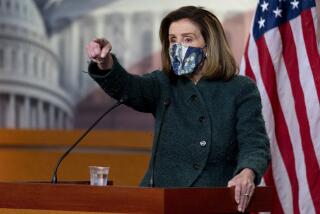South Africa Churches Stop Short of Action
- Share via
CAPE TOWN — Archbishop Desmond Tutu’s appeal to Christians not to vote on Oct. 26 came in a few quietly spoken sentences in an otherwise “apolitical” sermon preached at the installation last month of the Rev. Colin Jones as the Episcopal Church dean of Cape Town. The sermon was enough to hit the headlines and reopen the debate on church-state relations in South Africa.
Theologically the key words in the archbishop’s sermon are found in his insistance, “I’m not defying the government, I’m obeying God.” Also important is the fact that he does not speak in ecclesiastical isolation. He is reiterating the call made by 26 leaders of the major member churches of the South African Council of Churches this past summer.
In traditional theological debate, the legitimacy of church-state confrontation has been resolved in relation to the question of whether an individual or community is motivated by theological conviction. Should the motivation not be based on theological conviction, it may be judged the act of a responsible and brave person, but not a martyr. A secondary criterion has traditionally focused on the question of ecclesiastical consensus. A lone voice may or may not be of God; however, the Christian tradition has taught that consensus opinion should always be taken seriously.
Archbishop Tutu has spoken theologically and does so consistently with more “religious presence” than perhaps any other church leader in South Africa. He has also spoken in continuity with a position worked out with other church leaders, theologians and church members. Others, like Dr. Allan Boesak of the Dutch Reformed Church and the Rev. Frank Chikane of the Apostolic Faith Mission, have made similar calls, and the Convocation of Churches that met earlier in the year passed a resolution calling for a boycott of the October elections.
President P.W. Botha is therefore treading on extremely thin ice when he suggests that the archbishop and church leaders of his ilk do not speak or act on behalf of their respective churches. Minister of Police Adriaan Vlok is even wider off the mark when he says that the archbishop is acting at the instigation of the African National Congress.
Government officials are desperately trying to strike at the theological and ecclesiastical legitimacy of one who has emerged as South Africa’s most troublesome priest. One can only hope that they are not foolish enough to push their claim too far. If they do it is likely to backfire.
Debate aside, the “normal” activities of the church continue, and the average Sunday service (in city or township) seems unaffected by what the church leaders have said. Does a church-state conflict then exist in South Africa?
There is a chasm between theology and practice in the church. The mainline English-speaking churches have a well-worn record of theological and policy statements opposing apartheid. This much need not be debated. Equally true is the fact that these churches have consistently failed to translate their statements into a program of action, and many within both pulpit and pew have allowed their faith to be shaped by the theologically questionable adage that says religion and politics do not mix.
What this means in effect is that when the archbishop and others do seek to translate into practice a gospel that the churches have in theory and resolution already affirmed, they do so among people who are not accustomed to taking the political consequences of their faith too seriously. They have simply not, by training nor by habit, been equipped to do so.
It would nevertheless be a serious mistake to underestimate the support that the archbishop and others like him enjoy in the church. The black masses, who form the majority within the churches, instinctively understand and support the message proclaimed by the archbishop. And many white Christians, who might find their own brand of religiosity and life style threatened by what he and some others are saying, in their better moments know that the message is in accordance with the New Testament.
A new breed of church leadership is emerging that, cautiously and hesitantly, seems to be ready to work ecumenically in opposing the state. It is too early to know whether the church leaders, with the natural support of the majority of black Christians, will relocate the churches actively on the side of the struggle for social justice. With a long history of having failed institutionally to be politically engaged, the churches are not well-equipped to make the shift. On the other hand, the majority of the members of the churches are in favor of qualitative political change.
As the revolution intensifies, it is likely to become more and more in the self-interest of the institutional churches to shift their allegiance.
More to Read
Sign up for Essential California
The most important California stories and recommendations in your inbox every morning.
You may occasionally receive promotional content from the Los Angeles Times.













